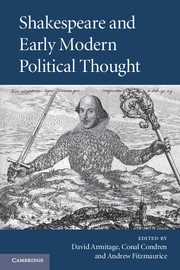Book contents
- Frontmatter
- Contents
- List of contributors
- Acknowledgements
- List of citations and abbreviations
- Introduction
- PART I CONTEXTS
- 1 Shakespeare's properties
- 2 The active and contemplative lives in Shakespeare's plays
- 3 Shakespeare and the ethics of authority
- 4 Shakespeare and the politics of superstition
- PART II THE COURT
- PART III THE COMMONWEALTH
- Afterword: Shakespeare and humanist culture
- Index
3 - Shakespeare and the ethics of authority
Published online by Cambridge University Press: 18 January 2010
- Frontmatter
- Contents
- List of contributors
- Acknowledgements
- List of citations and abbreviations
- Introduction
- PART I CONTEXTS
- 1 Shakespeare's properties
- 2 The active and contemplative lives in Shakespeare's plays
- 3 Shakespeare and the ethics of authority
- 4 Shakespeare and the politics of superstition
- PART II THE COURT
- PART III THE COMMONWEALTH
- Afterword: Shakespeare and humanist culture
- Index
Summary
In 1998, a friend of mine, Robert Pinsky, who at the time was serving as the Poet Laureate of the United States, invited me to a poetry evening at the Clinton White House, one of a series of black-tie events organised to mark the coming millennium. On this occasion the President gave an amusing introductory speech in which he recalled that his first encounter with poetry came in junior high school when his teacher made him memorise certain passages from Macbeth. This was, Clinton remarked wryly, not the most auspicious beginning for a life in politics.
After the speeches, I joined the line waiting to shake the President's hand. When my turn came, a strange impulse came over me. This was a moment when rumours of the Lewinsky affair were circulating, but before the whole thing had blown up into the grotesque national circus that it soon became. ‘Mr President,’ I said, sticking out my hand, ‘don't you think that Macbeth is a great play about an immensely ambitious man who feels compelled to do things that he knows are politically and morally disastrous?’ Clinton looked at me for a moment, still holding my hand, and said, ‘I think Macbeth is a great play about someone whose immense ambition has an ethically inadequate object.’
- Type
- Chapter
- Information
- Shakespeare and Early Modern Political Thought , pp. 64 - 79Publisher: Cambridge University PressPrint publication year: 2009
- 4
- Cited by



